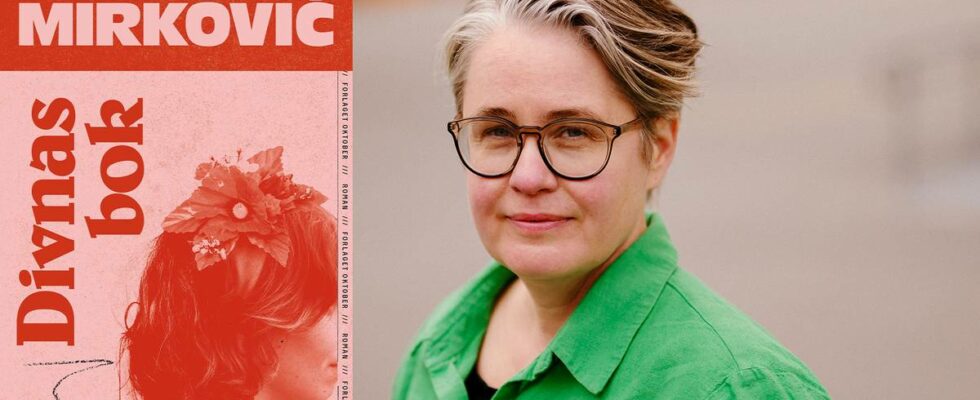A thought strikes me after reading Karoline Mirković’s debut novel. There was once a Yugoslav minority in Norway. They celebrated each other’s saints and danced together across ethnic and religious divides – until the country disappeared. Divna grows up in a block of flats on Veitvet with a North Norwegian mother and Yugoslav father. A more specific indication of ethnic origin is no longer necessary. Talking dance Divna meets her countrymen to dance every Sunday at the Yugoslav club, regardless of whether they are primarily Serbs, Croats, Bosnians or Macedonians. It is also when she dances kolo that she feels most alive. Karoline Mirković (1975) won the writing competition “Voices from Groruddalen” in 2022. The war in Ukraine made her “think about all the different ways a war damages both people and relationships,” a contributing factor to the book she is now debuting with (interview with Samtiden .no). Photo: Fartein Rudjord / October Vividly described are also the summers Divna spends in the mountain area of Zlatibor, in the west of today’s Serbia. Pre-filled uncles balance on rickety ladders, they press pear maps down glass bottles that will become the traditional spirit Rakij. A snarky cousin comments that you should actually use plums. Karoline Mirković has a watchful eye for the local customs, as seen in food, drink, music and the celebration of holidays. These customs are also maintained in Groruddalen, until the wars in the Balkans start. Then there will also be another dance at the club. The folk costume she has been dancing in, she has to get rid of, because the dance teacher thinks it is from Bosnia and Herzegovina. A small group that is thousands of kilometers away from their homeland can therefore, for political reasons, no longer dance together. It’s a strong, directly sparkling metaphor. The father is no longer Yugoslav, but Serbian. The mother takes on the job of explaining how the new map of the Balkans fits together. More Petterson than Lovrenski Before the disaster happens, we have witnessed a depiction of childhood that flows calmly away. The Veitvet of the 1970s has previously been immortalized in the novels of Per Petterson. Mirković shows the town of Drabant as it looked in the 1980s. She too has a distinctly spoken tone, more in the tradition of Petterson than last year’s Croatian-Norwegian literary sensation, Oliver Lovrenski. Dictator Tito’s atypical socialist state of Yugoslavia appears in a nostalgic light. This is how it must be when all you remember are the summers of your childhood. The consequences of the lack of democracy and authoritarian governance were mainly a problem for the adults. Yugoslavia wars Photo: Marco Vaglieri / news The wars in the Balkans in the 90s: a series of violent conflicts in the former Yugoslavia 1991–2001. Bitter ethnic conflicts between the ethnic groups. For the first time since World War II, the word genocide was officially used. The wars affected all the republics of the former Yugoslavia. The area is currently seven countries: Serbia, Montenegro, Croatia, Slovenia, Bosnia-Herzegovina, North Macedonia and Montenegro. Sources: Wikipedia/news.no And perhaps the time is now more ripe to see the positives of a country that was able to gather people under common denominators other than ethnicity and religion? Explains too much It is the mother who holds the family together when the war comes, and the portrait of the mother is one of the things that shines brightest in the novel. The mother exercises authority and care without big facts and gestures. And so it may seem as if Mirković wanted to tell his story as well. The story flows slowly, more mournfully than poignantly. In some places she explains more than necessary, not unusual for debutantes. In other places she masters the art of hinting, so that it is up to the reader to draw the conclusions. There was once a Yugoslav immigrant community in Norway. Many of them lived their lives in what is now Norway’s literary hotspot, Groruddalen. Karoline Mirković carefully writes out their story in “Divna’s Book”. news reviewer Photo: October Title: “Divna’s book” Author: Karoline Mirković Genre: Novel Number of pages: 410 Published: August 2024 Publisher: Oktober Hi! I read and review literature in news. Please also read my review of “Kairos” by Jenny Erpenbeck, “Details” by Ia Genberg, or Franz Kafka’s “The Process” translated by Jon Fosse. Published 28.08.2024, at 22.29
ttn-69
“Divna’s Book” by Karoline Mirković – Reviews and recommendations

